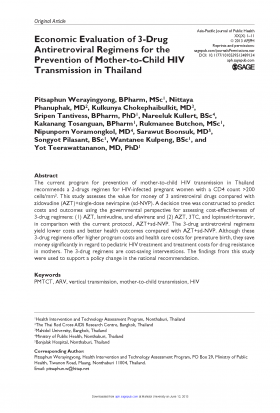This website uses cookies so that we can provide you with the best user experience possible. Cookie information is stored in your browser and performs functions such as recognising you when you return to our website and helping our team to understand which sections of the website you find most interesting and useful.
Economic Evaluation of 3-Drug Antiretroviral Regimens for the Prevention of Mother-to-Child HIV Transmission in Thailand (2015)

รายละเอียดเพิ่มเติม
Pitsaphun Werayingyong, BPharm, MSc1, Nittaya Phanuphak, MD2, Kulkunya Chokephaibulkit, MD3, Sripen Tantivess, BPharm, PhD1, Nareeluk Kullert, BSc4, Kakanang Tosanguan, BPharm1, Rukmanee Butchon, MSc1, Nipunporn Voramongkol, MD4, Sarawut Boonsuk, MD5, Songyot Pilasant, BSc1, Wantanee Kulpeng, BSc1, and Yot Teerawattananon, MD, PhD1
Abstract
The current program for prevention of mother-to-child HIV transmission in Thailand recommends a 2-drugs regimen for HIV-infected pregnant women with a CD4 count >200 cells/mm3. This study assesses the value for money of 3 antiretroviral drugs compared with zidovudine (AZT)+single-dose nevirapine (sd-NVP). A decision tree was constructed to predict costs and outcomes using the governmental perspective for assessing cost-effectiveness of 3-drug regimens: (1) AZT, lamivudine, and efavirenz and (2) AZT, 3TC, and lopinavir/ritonavir, in comparison with the current protocol, AZT+sd-NVP. The 3-drug antiretroviral regimens yield lower costs and better health outcomes compared with AZT+sd-NVP. Although these 3-drug regimens offer higher program costs and health care costs for premature birth, they save money significantly in regard to pediatric HIV treatment and treatment costs for drug resistance in mothers. The 3-drug regimens are cost-saving interventions. The findings from this study were used to support a policy change in the national recommendation.
Full text can be accessed from:
http://aph.sagepub.com/content/early/2013/05/31/1010539513489134




